17 Aug 2017 | Bahrain, Bahrain News, Middle East and North Africa, News and features
[vc_row][vc_column][vc_column_text]
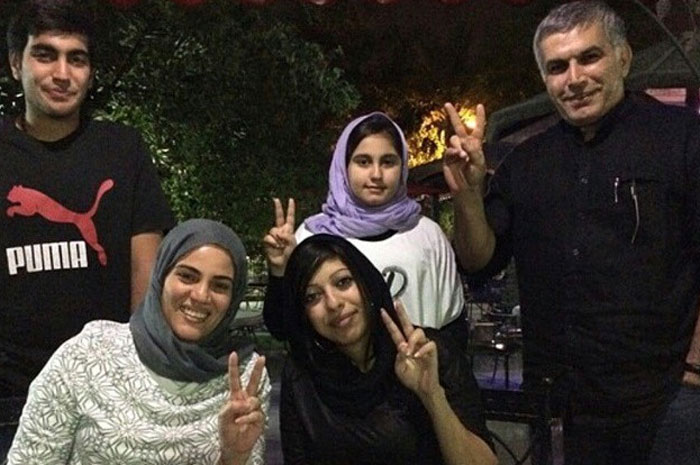
Back Row from left: Adam Rajab, Malak Rajab and Nabeel Rajab. Front Row from left: Sumaya Rajab and Zainab Alkhawaja. (Photo: Adam Rajab)
Human rights defenders often confront obstacles that make their work difficult. This is especially true in Bahrain, where the Sunni monarchy and government have been bent on silencing all opposition ever since the Arab Spring when tens of thousands of Bahraini citizens protested for democratic reform.
In recent months, the nation’s only independent news outlet, Al Wasat, was shuttered and prominent human rights activist Nabeel Rajab was sentenced to two years in prison for “spreading fake news”.
The families of activists suffer along with their loved ones and are often targeted with official harassment: detention, loss of employment, beatings and harassment. Each case is an individual story of a struggle for freedom.
A result of actions
Members of Sayed Ahmed Alwadaei’s family have been harassed and detained due to his ongoing campaigning for democracy and human rights in Bahrain. Most recently his mother-in-law and brother-in-law were detained while Alwadaei attended the United Nations Human Rights Council in March.
Alwadaei, director of advocacy at the Bahrain Institute for Rights and Democracy, is no stranger to detention: he was arrested twice in 2011 and served a six-month sentence in a Bahraini jail. He found asylum in the UK in July 2012. In February 2015, Alwadaei was among 72 Bahraini citizens to be stripped of their citizenship.
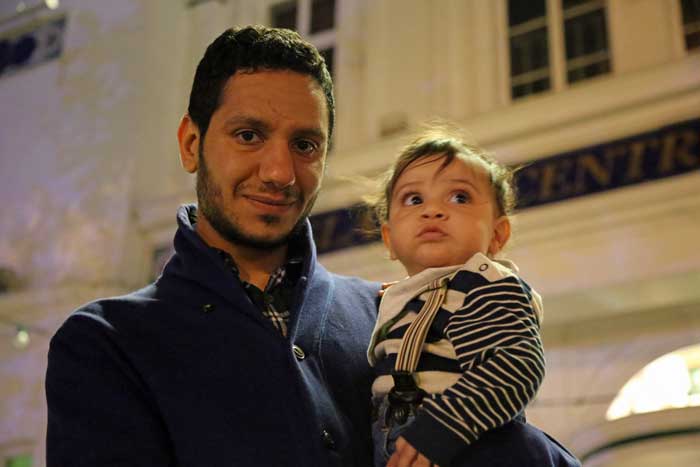
Sayed Ahmed Alwadaei with his son Yousif (Photo: Moosa Satrawi)
In October 2016, Alwadaei’s wife and infant son Yousif also faced official harassment as they tried to leave Bahrain to join Alwadaei in the UK. His wife was arrested at the airport and held overnight, during which time she was ill-treated. It was not until a few months later that she and her son were able to leave the country.
Other members Alwadaei’s family, including his sister, have also faced interrogations.
When asked how he continues campaigning under these circumstances, Alwadaei told index: “We can only get through this by sticking together and staying strong. It’s important to have a supportive family. The potential for arrest and torture is something they know and have to be willing to sacrifice.”
He added that he is balancing his efforts to get his mother-in-law out of prison while continuing his work in activism. “It’s hard but this is the right thing to do.”
“The oppression or torture aims to do one thing: to break your will because you’re not ready for the consequences,” Alwadaei said. “This is the state they want to leave you in. They want you to be broken and this is why we keep going.”
A life-long struggle
Maryam Al-Khawaja has been preparing for and participating in the struggle for human rights her entire life.
As a young child growing up in Denmark, she and her three sisters attended an English-speaking school, but the Al-Khawaja family knew they were only in the country temporarily. Her mother and father had been exiled for speaking out in Bahrain.
At a very young age, she remembers her parents asking her and her siblings before bed: “What have you done today to make the world a better place?” She told Index that her father wouldn’t help them answer the question because he wanted them to think about how the world could be. She remembers dinner conversations alive with politics and philosophical discussion about whether having false hope or no hope was better.
Around the 7th or 8th grade, Al-Khawaja knew wanted to be like her father when she grew up; she wanted to be an activist.
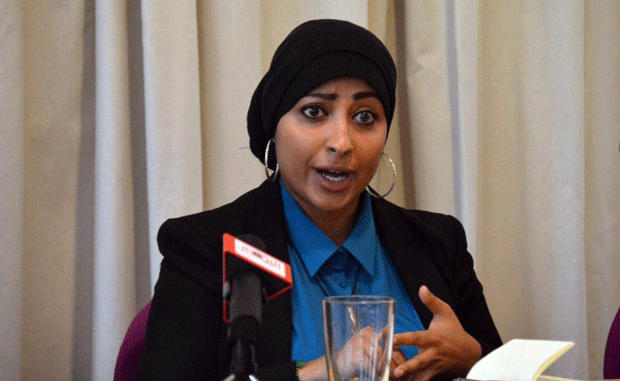
Maryam Al-Khawaja (Photo: David Coscia for Index on Censorship)
Al-Khawaja was 14 when her family returned to Bahrain in 2001. She recalls thinking her family was ready to take on the challenges and that the people of Bahrain would be ready to fight with them. But that was not the case. The country was tired of conflict and believed that the king’s promised reforms would be implemented. At the same time, activists were not popular among ordinary Bahrainis.
At college she said she was criticised by her classmates for speaking her mind about the state of their country, which caused her to lose interest in her father’s reform work. At the time, she asked him: “Why are you trying to change a situation for people who don’t want to change it for themselves?” His response was simple: “Someday you will understand.”
It wasn’t until 2011 during the Arab Spring protests that she developed a newfound respect for her father and was ashamed of herself for ever doubting him. She admits growing up in Denmark made her think fighting for human rights would be easy. When her father, along with 12 other leaders of the uprising, was arrested and sentenced to life imprisonment, she found that a life of campaigning isn’t so effortless.
During our conversation, Al-Khawaja jumped off the phone for a few minutes to take a call from her father. She had not heard from him in over three weeks and said their phone calls are always random and typically short as it is normal for the line to be cut if anything about the Bahrain government or any activist’s work is mentioned.
Until recently, her mother and sisters in Bahrain had not seen her father since February as their requests to visit have continually been denied. Al-Khawaja has not seen her father since 2014 as there are multiple fabricated charges against her that would mean imprisonment if she returned to the country.
Since her father’s imprisonment, Al-Khawaja and her older sister Zainab have been active in the push for human rights and freedom of speech in Bahrain. She says her father has two main characteristics as an activist: a fierce advocate and a fiery speaker. She explained that she and Zainab are the two parts to that whole: Al-Khawaja as the advocate and Zainab as the speaker.
Al-Khawaja said the work of her father and her sister Zainab has been tough for her two younger sisters. One sister had the highest scores in nursing school in Bahrain and graduation seemed to promise a job. But the paperwork from the government granting her access to work never came. She’s been waiting nearly eight years without a job. Al-Khawaja said it’s difficult for her family members when they’re in jail as they have to “take care of us when we cannot take care of ourselves”.
Her mother also felt the effects of the family member’s work when she was fired from her private school teaching job where she was the head of guidance.
A cause for celebrity status never wanted
Adam Rajab realised when he was young that his father Nabeel wasn’t like other dads. “I was so confused ‘why does my father work all day, while other fathers have certain working hours?,’” he told Index.
During a holiday he asked his father to take a break for a day. His father answered: “My colleagues are in prison. I can’t stop my work because they are suffering behind bars.”
In 2006, when Rajab was nine years old, he vividly recalls seeing his father come home bleeding from his head with a swollen and bruised back. “I was shocked and terrified but my father continued protesting like nothing had happened,” he said. “This was terrifying to me but the determination and fearlessness I saw in him really inspired me.”
In 2011 Nabeel Rajab’s work became well known. He appeared on TV and was the first activist to use social media to support the revolution then sweeping Bahrain. “Wherever we went, people would stop him and start taking pictures,” Adam said, adding that the strange situation was a shock to the family. “It started to become difficult because we couldn’t enjoy a private life like we used to.”
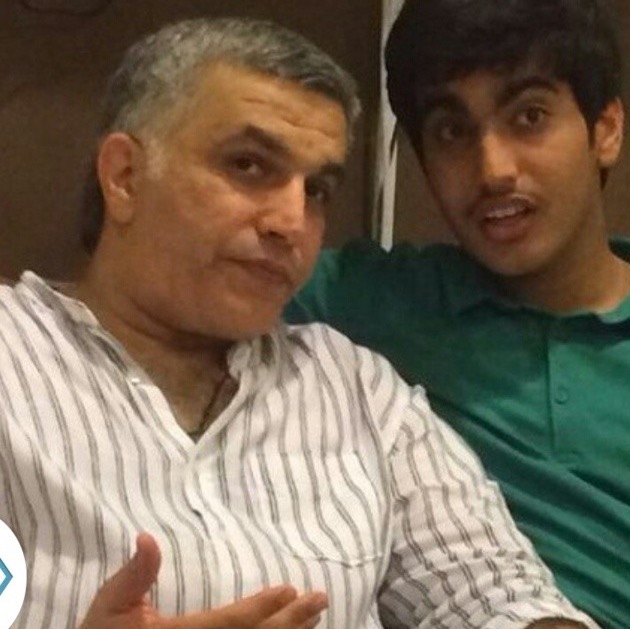
Nabeel Rajab with his son Adam Rajab
As a leader of the movement, Rajab’s father has become a face leaders around the world recognise but do little about. For years he has been in and out of jail. On 10 July 2017 he was sentenced to two years in prison for “broadcasting fake news”.
Although no one in the family has been arrested, his mother was harassed at her government job and then fired. Rajab and his sister have also faced harassment in school.
Rajab and his father have a very close relationship so the imprisonment has not been easy. “I haven’t seen him for more than a year now and he faces more charges which probably means more prison sentences,” Rajab said. “I find it difficult to enjoy anything while he is locked up in a cell and deprived of life, but as he taught me, the spirit is always up.”
Rajab wants his father to free and for them to live like any other ordinary family, but this does not take away from how proud he is or the strength of his belief in his father’s cause.
An open ended sentence
It’s difficult to imagine the emotions these activists and their families go through on a daily basis. A psychologist from the Refer Self Counselling Psychology Practice explained to Index that having a family member with a sentence with a sure release date is one case but when trials or release dates are postponed time and time again as they are in Bahrain, it is much more difficult. “We are rational problem solvers but not good with the unpredictable.”
The psychologist explained the situation in Bahrain is unlike what most with family members behind bars will ever experience. False hope puts an even greater emotional strain on loved ones.[/vc_column_text][/vc_column][/vc_row][vc_row][vc_column][vc_row_inner][vc_column_inner][vc_basic_grid post_type=”post” max_items=”4″ element_width=”6″ grid_id=”vc_gid:1503052292764-bb1a6c59-5e91-2″][/vc_column_inner][/vc_row_inner][/vc_column][/vc_row]
16 Aug 2017 | Magazine, News and features, Volume 46.02 Summer 2017
[vc_row][vc_column][vc_column_text]
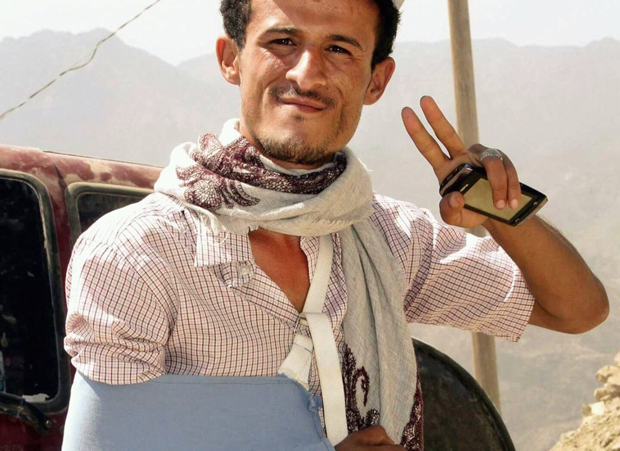
Yemeni journalist Abdulaziz Muhammad al-Sabri wears a sling after he was shot by a sniper in 2015
[/vc_column_text][/vc_column][/vc_row][vc_row][vc_column][vc_custom_heading text=”Yemeni journalist Abdulaziz Muhammad al-Sabri details the dangers of reporting in his country. Interview by Laura Silvia Battaglia”][/vc_column][/vc_row][vc_row][vc_column][vc_column_text]
Abdulaziz Muhammad al-Sabri is smiling, despite everything. But he cannot fail to feel depressed when he sees the photos taken a few months ago, in which he is holding a telephoto lens or setting up a video camera on a tripod: “The Houthis confiscated these from me. They confiscated all my equipment. Even if I wanted to continue working, I wouldn’t be able to.”
Al-Sabri is a Yemeni journalist, filmmaker and cameraman, and a native of Taiz, the city that was briefly the bloodiest frontline in the country’s civil war. He has worked in the worst hotspots, supplying original material to international media like Reuters and Sky News. “I have always liked working in the field,” he said, “and I was really doing good work from the start of the 2011 revolution.”
But since the beginning of the war, the working environment for Yemeni journalists has progressively deteriorated. In the most recent case, veteran journalist Yahia Abdulraqeeb al-Jubaihi faced a trial behind closed doors and was sentenced to death after he published stories critical of Yemen’s Houthi rebels. Many journalists have disappeared or been detained, and media outlets closed, in the past few years.
“The media industry and those who work in Yemen are coming up against a war machine which slams every door in our faces, and which controls all the local and international media bureaus. Attacks and assaults against us have affected 80% of the people employed in these professions, without counting the journalists who have already been killed, and there have been around 160 cases of assaults, attacks and kidnappings. Many journalists have had to leave the country to save their lives. Like my very dear friend Hamdan al-Bukari, who was working for Al-Jazeera in Taiz.”
Al-Sabri wanted to tell his story to Index on Censorship without leaving out details “because there is nothing left for us to do here except to denounce what is going on, even if nobody is listening to us”. He spoke of systematic intimidation by the Houthi militias in his area against journalists in general, and in particular against those who work for the international media: “In Taiz they have even used us as human shields. Many colleagues have been taken to arms depots, which are under attack from the [Saudi-led, government-allied] coalition, so that once the military target has been hit, the coalition can be accused of killing journalists.”
[/vc_column_text][/vc_column][/vc_row][vc_row][vc_column width=”1/4″][vc_icon icon_fontawesome=”fa fa-quote-left” color=”custom” align=”right” custom_color=”#dd3333″][/vc_column][vc_column width=”3/4″][vc_custom_heading text=”In Taiz they have even used us as human shields” google_fonts=”font_family:Libre%20Baskerville%3Aregular%2Citalic%2C700|font_style:400%20italic%3A400%3Aitalic”][/vc_column][/vc_row][vc_row][vc_column][vc_column_text]
This sort of intimidation is one of the reasons why researching and reporting on the conflict is very difficult. “In Taiz and in the north, apart from those working for al-Masirah, the Houthis’ TV station, and the pro-Iranian channels, al-Manar and al-Alam, only a few other journalists are able to work from here, and those few, local and international, are putting their necks on the line,” said al-Sabri.
“You’re lucky if you can make it, otherwise you fall victim to a bullet from the militias, attacks, kidnappings. Foreigners are unable even to obtain visas because of the limitations imposed by [Abdrabbuh Mansour] Hadi’s government and the coalition. The official excuse is that the government ‘fears’ for their lives, since if they were kidnapped, imprisoned or died in a coalition bombardment, it would be the Yemeni government’s responsibility.”
Al-Sabri has personal experience of the violence against journalists in Yemen. In December 2015, he was wounded in the shoulder by a sniper who was aiming at his head. On another occasion, he was kidnapped, held at a secret location for 15 days, blindfolded, threatened with death and tortured.
The full article by Laura Silvia Battaglia is available with a print or online subscription.
[/vc_column_text][/vc_column][/vc_row][vc_row][vc_column][vc_column_text]
Award-winning journalist Laura Silvia Battaglia reports regularly from Yemen. Translated by Sue Copeland.
This article is published in full in the Summer 2017 issue of Index on Censorship magazine. Print copies of the magazine are available on Amazon, or you can find information about print or digital subscriptions here. Copies are also available at the BFI, the Serpentine Gallery, MagCulture, (London), News from Nowhere (Liverpool), and Home (Manchester). Each magazine sale helps Index on Censorship continue its fight for free expression worldwide.
[/vc_column_text][/vc_column][/vc_row][vc_row][vc_column][vc_custom_heading text=”From the Archives”][vc_row_inner][vc_column_inner width=”1/3″][vc_single_image image=”80562″ img_size=”213×289″ alignment=”center” onclick=”custom_link” link=”http://journals.sagepub.com/doi/pdf/10.1177/0306422014550963″][vc_custom_heading text=”The future of Yemeni journalists” font_container=”tag:p|font_size:24|text_align:left” link=”url:http%3A%2F%2Fjournals.sagepub.com%2Fdoi%2Fpdf%2F10.1177%2F0306422014550963|||”][vc_column_text]September 2014
The Yemeni government should not be the ones judging the objectivity of reporting, but there is hope for more freedom.[/vc_column_text][/vc_column_inner][vc_column_inner width=”1/3″][vc_single_image image=”80569″ img_size=”213×289″ alignment=”center” onclick=”custom_link” link=”http://journals.sagepub.com/doi/pdf/10.1177/0306422016657007″][vc_custom_heading text=”Journalists face increasing threats” font_container=”tag:p|font_size:24|text_align:left” link=”url:http%3A%2F%2Fjournals.sagepub.com%2Fdoi%2Fpdf%2F10.1177%2F0306422016657007|||”][vc_column_text]June 2016
Rachael Jolley explains why journalists around the world, especially near the Middle East, are facing increasing threats.[/vc_column_text][/vc_column_inner][vc_column_inner width=”1/3″][vc_single_image image=”80562″ img_size=”213×289″ alignment=”center” onclick=”custom_link” link=”http://journals.sagepub.com/doi/pdf/10.1177/0306422014548392″][vc_custom_heading text=”Journalists should ignore technology” font_container=”tag:p|font_size:24|text_align:left” link=”url:http%3A%2F%2Fjournals.sagepub.com%2Fdoi%2Fpdf%2F10.1177%2F0306422014548392|||”][vc_column_text]September 2014
Journalists in war zones may need to ignore technology and go back to old ways to avoiding surveillance, says Iona Craig.[/vc_column_text][/vc_column_inner][/vc_row_inner][vc_separator][/vc_column][/vc_row][vc_row content_placement=”top”][vc_column width=”1/3″][vc_custom_heading text=”100 Years On” font_container=”tag:p|font_size:24|text_align:left” link=”url:https%3A%2F%2Fwww.indexoncensorship.org%2F2017%2F06%2F100-years-on%2F|||”][vc_column_text]Through a range of in-depth reporting, interviews and illustrations, the summer 2017 issue of Index on Censorship magazine explores how the consequences of the 1917 Russian Revolution still affect freedoms today, in Russia and around the world.
With: Andrei Arkhangelsky, BG Muhn, Nina Khrushcheva[/vc_column_text][/vc_column][vc_column width=”1/3″][vc_single_image image=”91220″ img_size=”medium” alignment=”center” onclick=”custom_link” link=”https://www.indexoncensorship.org/2017/06/100-years-on/”][/vc_column][vc_column width=”1/3″ css=”.vc_custom_1481888488328{padding-bottom: 50px !important;}”][vc_custom_heading text=”Subscribe” font_container=”tag:p|font_size:24|text_align:left” link=”url:https%3A%2F%2Fwww.indexoncensorship.org%2Fsubscribe%2F|||”][vc_column_text]In print, online. In your mailbox, on your iPad.
Subscription options from £18 or just £1.49 in the App Store for a digital issue.
Every subscriber helps support Index on Censorship’s projects around the world.
 SUBSCRIBE NOW[/vc_column_text][/vc_column][/vc_row]
SUBSCRIBE NOW[/vc_column_text][/vc_column][/vc_row]
14 Aug 2017 | Awards, Fellowship, Fellowship 2017, News and features
[vc_row][vc_column][vc_single_image image=”89311″ img_size=”full” alignment=”center”][vc_column_text]Freedom of Expression Campaigning Award-winner Ildar Dadin has returned to activism since his release from prison in February when his conviction was overturned by Russia’s constitutional and supreme courts.
Dadin was sentenced to three years in prison in December 2015 under a 2014 public assembly law. His crime was staging one-man pickets, often holding a billboard, in public. In November 2016, a letter from Dadin to his wife was published, exposing torture he experienced in prison. In April 2017, Dadin was prevented from attending the Index Freedom of Expression Awards in London.
When asked about the international attention his imprisonment received, Dadin expressed that he feels Russian civil society is part of a global society, rather than a totally isolated group. He believes that pressure from civil society both in Russia and abroad were partially responsible for his release. The ultimate goal of his activism shares this global view. He hopes for “justice for all people, not just Russians, humans”.
In June, Dadin was awarded the Boris Nemtsov Prize, which honours individuals who are “particularly committed to fighting for the freedom of expression and helping those who are persecuted on political, racial or religious grounds.” Dadin previously referenced Nemtsov as an example of a Russian opposition leader killed for his activism and beliefs in his Index Awards acceptance speech . Without proper travel documents, Dadin was unable to attend the awards ceremony.
A Russian court ordered the Russian Ministry of Finance to pay Dadin a compensation of 2.2 million rubles for unlawful criminal prosecution in May. He originally demanded five million rubles, and in June filed an appeal to increase the compensation.
Previous prosecution for his activism has not stopped Dadin from continuing to push for freedom of expression in Russia. In June, he read aloud from the Russian constitution on Red Square. He was fined 20,000 rubles ($350) for holding a public gathering without permission.
Moving forward, Index is helping Ildar with his transition to life outside of prison and prioritizing his health.
Additional reporting by Claire Kopsky[/vc_column_text][/vc_column][/vc_row][vc_row][vc_column][vc_basic_grid post_type=”post” max_items=”12″ style=”load-more” items_per_page=”4″ element_width=”6″ grid_id=”vc_gid:1502705474532-50095286-2580-2″ taxonomies=”9013″][/vc_column][/vc_row]
14 Aug 2017 | Index in the Press, News and features
[vc_row][vc_column][vc_single_image image=”95179″ img_size=”full” alignment=”center”][vc_column_text]This column originally appeared in the Evening Standard.[/vc_column_text][vc_column_text]”Part of building an open, inclusive environment means fostering a culture in which those with alternative views…feel safe sharing their opinions.” Hear, hear. This is a view that so chimes with my beliefs as a free-speech campaigner that I could have written it myself. In fact, those are the words of Danielle Brown, Google’s vice-president of diversity, integrity and governance, in response to the furore over the so-called Google manifesto — the 10-page document in which Google software engineer James Damore outlined his views on why women don’t reach the top roles in certain jobs, arguing why the company’s diversity pushes were misplaced. Google so cherishes diversity it sacked a man for expressing an opinion it didn’t agree with… Spot a problem here?
In all the furore surrounding Damore’s memo, most of the focus has been on critiquing the views he expressed on the differences between men and women, but far less attention has been paid to the broader point he was trying to make: that unpopular views, views that did not accord with the mainstream ideology in the company, could not be expressed. And that this in turn could lead to a monotheistic culture that is not good for business.
“When it comes to diversity and inclusion, Google’s Left bias has created a politically correct monoculture that maintains its hold by shaming dissenters into silence,” Damore wrote. By sacking him, Google made Damore’s point for him.
Damore expressed a viewpoint that did not accord with the mainstream and he was sacked. I have read plenty of articles arguing he was dismissed not for expressing his opinion but because the expressing of that opinion made colleagues feel unsafe or uncomfortable (more on that later), or justifying the sacking because an employer has the right to discipline employees where their behaviour brings the company into disrepute. But actually, what those who defend Damore’s sacking are really doing is reinforcing something that is increasingly prevalent in our societies: a kind of liberal intolerance.
[/vc_column_text][vc_row_inner][vc_column_inner width=”1/4″][vc_icon icon_fontawesome=”fa fa-times-circle” color=”black” background_style=”rounded” size=”xl”][/vc_column_inner][vc_column_inner width=”3/4″][vc_column_text]
Ideas are not challenged by silencing them.
[/vc_column_text][/vc_column_inner][/vc_row_inner][vc_column_text]I heard it a lot in the wake of the killings at French satirical magazine Charlie Hebdo: “I believe in free speech, but…” and after that “but” came all kinds of things that the supposed defenders of free speech were in favour of censoring because they felt such censorship would better protect marginalised communities. The argument seemed to be that by banning certain kinds of speech we would somehow miraculously eradicate the dangerous, insidious and hateful viewpoints that underlie it.
This “it is OK to censor certain opinions” line is one most clearly articulated in universities — something Damore alluded to in his own manifesto. Views that are considered offensive are dubbed harmful, and speakers are drummed off campus — in some cases physically. In one incident earlier this year, Dr Charles Murray — a political scientist labelled a “white nationalist” for his book linking race and intelligence — was attacked by students after he tried to give a talk at Middlebury College in Vermont.
Ideas are not challenged by silencing them. Indeed, the video of Murray being shouted down by a group of students denying his right to speak demonstrates how an event that could have been an opportune moment to challenge ideas with which the students disagreed simply became an exercise in controlling the narrative. Imagine if the opposite had happened. Imagine if a Black Lives Matter activist had been shut down on campus by a ranting white supremacist mob. There would have been an international uproar.
And that’s the point. Free speech — genuine free speech that tolerates the ideas we find most offensive — must apply equally. It must apply to the ideas we hate as much as to the ideas we champion. What protects Damore’s right to opine that women are “more co-operative and agreeable than men” (Seriously? Has Damore met any actual women?) is also what protects my right to say his views are a laughable load of bollocks. What gives my views the right to be protected and his not?
Those in favour of constraining what others say often do so in the belief that it’s easy to identify, and agree on, good and bad speech. But consider the example of Iranian political activist and human-rights campaigner Maryam Namazie who, in 2015, was repeatedly heckled at an event on blasphemy at Goldsmiths college by members of the Islamic Society and accused of Islamophobia. In one of the great ironies created by the growing “safe space” movement, in which offensive ideas are dubbed so harmful they must be silenced, the Feminist Society at Goldsmiths said it stood in solidarity with the Islamic Society.
This equation of offensive speech with harm lies at the heart of the Google manifesto row, and much of the de facto censorship in operation in companies, online and on campus. Focusing on speech as harm is an easy fix. Don’t like what someone says? Ban them and, lo, we will be safer. (Turkey’s President, Recep Tayyip Erdogan, is a current good example of this in practice but the UK government’s repeated attempts to deal with “extremist” speech also risk going down this road). This is an easy fix because dealing with the problems underlying the words are so much harder: discrimination based on race, gender, sexuality, religion.
But homing in on speech is a false and dangerous fix. Banning ideas does not make those ideas go away — all too often the banning of an idea gives it more attention — and silencing those with whom we disagree is not the way to the more tolerant and diverse society Google envisages. Far better to let our opponents speak and then challenge them, openly, vocally. And work harder to address the structural problems that persistently marginalise certain groups and so give them a greater voice.[/vc_column_text][/vc_column][/vc_row][vc_row][vc_column][vc_basic_grid post_type=”post” max_items=”12″ style=”load-more” items_per_page=”4″ element_width=”6″ grid_id=”vc_gid:1502698304215-3aa8abeb-3e1e-8″ taxonomies=”6323″][/vc_column][/vc_row]





